I’m not sure anyone can tell you if you’d enjoy Death Stranding. Hideo Kojima’s most recent directorial effort is so powerfully idiosyncratic in its gameplay loop that you’d have to try it, and for a few hours at least, to decide whether the game was any fun for you. It’s a matter of taste, and unlike whether or not you should, like, put ketchup on steak, there’s no “good taste” answer to fall back on. People are just going to have different opinions about how fun this game is. Imagine it this way: If I tell you that I find a sunset beautiful, and you fire back and say the sunset is garbage, there’s not much either of us can do to argue each other away from our positions. I’ll think the sunset’s pretty; you’ll think it’s ugly.
This is a long way of saying that I won’t be arguing here if Death Stranding is fun or nice to look at or funny or gripping. For the record, I had a good time playing it, and it is pretty nice to look at if a bit samey during the mountain climbing portions; if you want more than that, there are tons of articles for you out there written by really intelligent people. What I’m going to be arguing about here is the very particular claim that Death Stranding makes about America, American exceptionalism, and connectivity, and how that claim falls short. More simply, I’ll be arguing that Death Stranding tries to argue that America, such as it is in 2019, represents an insufficient and even dangerous political project, but that due to its maximalist perspective and a tendency to touch on everything broadly instead of one thing perceptively, the game ultimately produces a muddied, incoherent series of ideas instead of an argument.
Death Stranding’s (and Kojima’s) tendency to complicate for no reason other than complication’s sake ends up depoliticizing the game. The early game presents an America that’s mostly artifice—an oval office that’s depicted through a hologram projection over a gray hospital room; devices for “linking citizens” that look more like handcuffs; and a de facto leader, Die-Hardman, who literally wears a mask through 95 percent of the game—and the game honestly seemed to be presenting a narrative that would attack fantasies of “going back” to the old days, fantasies in no short supply in our own American moment. But as the game introduces more and more to the world and plot it presents, this simple critique becomes muddied in a way that doesn’t make it more complex but instead smooths out any contradiction or critique in favor of a happy ending in which the nation could be saved and humanity might survive another day. In other words, Death Stranding starts out with a pointed approach but settles on a description of America as a land of contrast, one that is not only depoliticized but politically frustrating on its own merits. To see how, though, we’ll have to dig a bit into the plot.
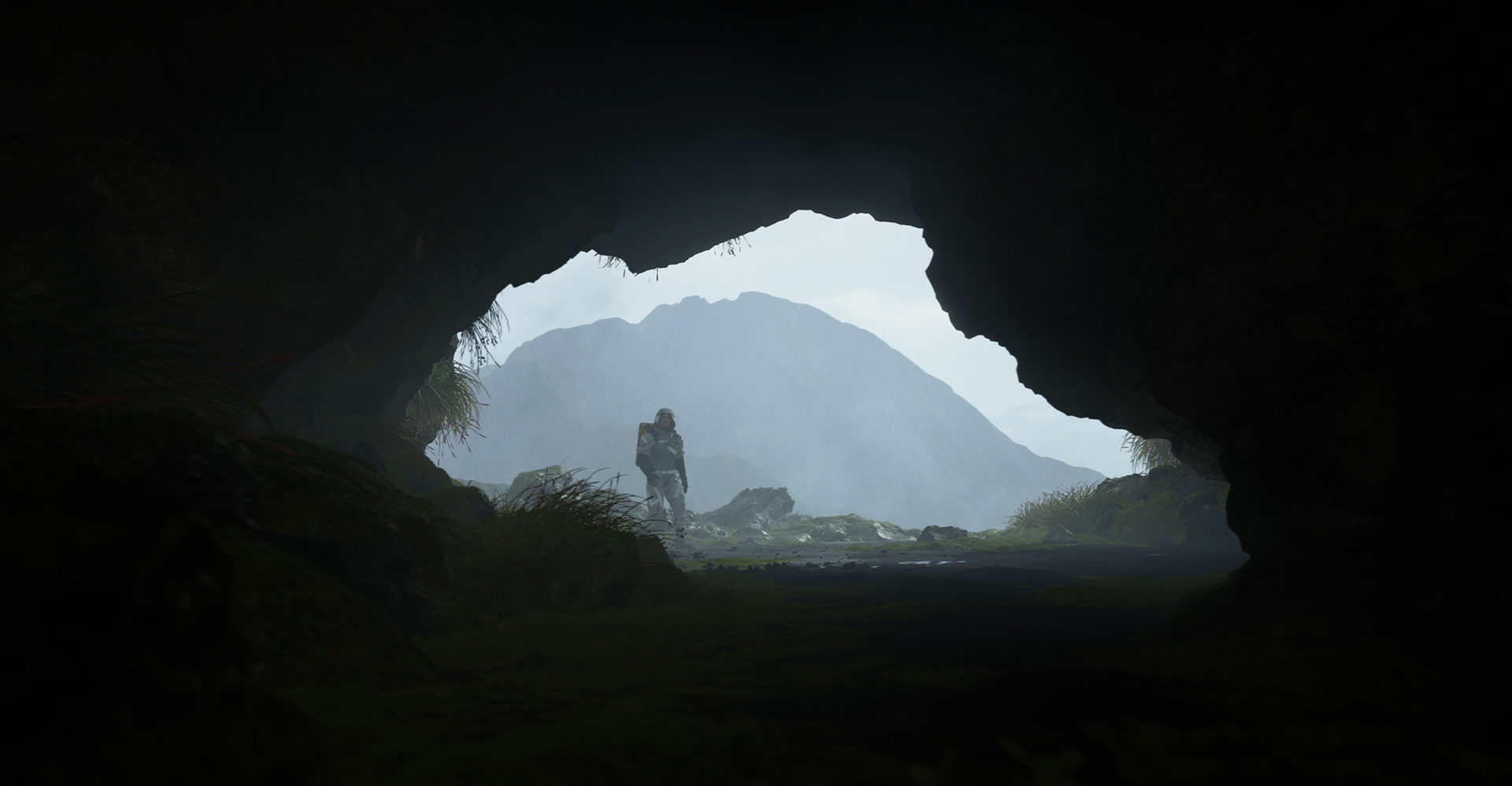
Death Stranding opens on an unfamiliar world without a lot of explanation. Through context clues and explication, we learn that the world is populated by ghosts—BTs—who can both kill and claim the corpses of humans, causing a “voidout,” or a small, dead-body-driven bomb blast. These blasts have a staggering impact, some taking out entire cities, so bodies need to be incinerated and people live underground, either crowded together in cities or on the periphery as “preppers”—a kind of vivification of the strange bunker mentality of our own prepper community in 2019. Add to this that there’s a frequent kind of rain, timefall, that ages anything it touches instantly, along with roving bands of marauders who will rob you blind while knocking you senseless, and you have a fairly terrifying prospect here. It’s no wonder then that we need our hero, Sam Bridges, portrayed by Norman Reedus, to step in as an unwilling and unlikely deliverer of mankind, a savior, a force for hope in the most hopeless moment of our world doing a job that would make the bravest among us weep. That’s right—he has to be a mailman.
And like the mailmen of our own time, he should be and in fact already is appreciated for the hard work he does. His shift into messianic hero comes only when he’s tasked by his mother, the President of the United Cities of America, with connecting the chiral network across the country. Sam, being estranged from his mother, is a bit wary of fulfilling her dying wish, but he agrees when he finds out that his foster sister, Amelie, is in trouble all the way on the West Coast. His devotion to Amelie overcomes his sincere distrust of his mother, and we begin the long and winding journey of Death Stranding. The chiral network is—for the purposes of this essay and so as not to bog us down with the practical epistemology of Kojima’s world-building when we have such limited time—a sort of hyper-internet, capable of not only connecting people with information but also providing a cross-dimensional time-dilation that allows for the rapid construction of bridges, roads, towers, generators, vehicles, and more. (Again, we’ll leave it at this to avoid six to eight paragraphs on the Beach.) This is how the infrastructure-building element of Death Stranding is introduced, and also how Sam goes from performing a brutal slog with every delivery to having quick fast-travel and dangerous weapons to ease his way.
With expanding the chiral network serving as the central motivation, Kojima seems to be presenting a simple but legible parable of connectivity—Sam has to unite the world, and in doing so get over his aversion to people. This transformation is as literal as it is figurative for Sam, whose DOOMs gives him a deeper connection to the BTs around him, and who suffers from aphenphosmphobia (though whether this comes from his DOOMs or his previous trauma, we are unsure). But from there, the plot complicates and deepens this parable, as good plot tends to do; unfortunately for us, there are far too many turns and complications, to the point that the game introduces issues of gender, family, death, parenthood, country, belonging, paranoia, metaphysics, and more to a game that, at times, feels like it’s rushing through its plot to get back to its deliveries. As a result, what begins as a focused consideration of nation-as-family becomes a sprawling and unsatisfyingly cursory account of everything and anything that makes people human.
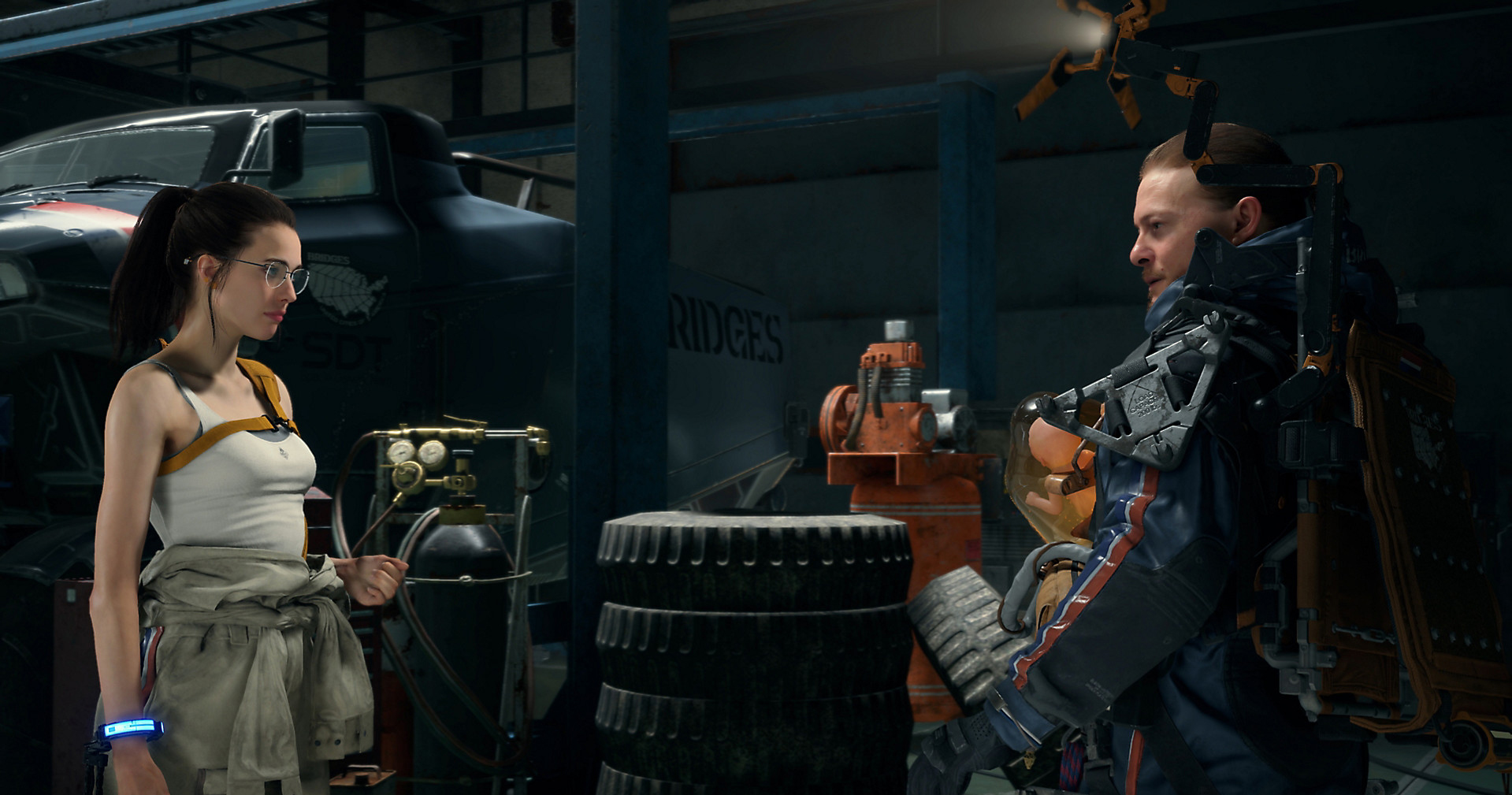
This is no surprise in a Kojima game of course, and the usual mechanics we’ve seen since Snatcher are used to pick up the expositional slack: interviews, emails, plot options you need to seek out by finishing esoteric missions like pizza delivery—the game hides its lore in all kinds of tricky places. And that’s not a bad thing! Loredumps can be fun, but I prefer Death Stranding’s method of keeping it away from anyone not seeking it out. The game works perfectly well if you stick to just the on-screen story, getting its plot across clearly and explaining a vast, confounding premise to a successful conclusion. The issue is that all of these efforts, on-screen and off-, seem to be focused on explaining how the world of Death Stranding works practically and theoretically. And while such an explanation is of course important to any player that has to trudge up and down mountains to deliver oxytocin to a reclusive prepper, the game itself has explicitly higher ambitions; it wants to make a political argument as well. It’s just that the game, or Kojima, or some combination of both, never actually decides what this argument is.
Returning to my thought experiment above for a second—if you and I were arguing about sunsets and their ecological impact, that argument might go along smoothly so long as we both stuck generally to our relative claims. The second I get off track, though—say, by arguing that actually, the politicians and not the sunsets are to blame for ecological strife—we start getting a bit confused. Then imagine I do this again and again and again—now the politicians, now a secret cabal of elites, now the universities, now aliens, etc., etc. With each shift in the argument, the point we were both trying to make becomes more distant, more generalizable. By the end of the argument, we may be arguing about nothing more than argument itself, eventually agreeing that we clearly disagree. This, after all, is what Death Stranding does.
The plot of the game can honestly be gripping, though. Kojima has his normal issues with women, but they feel more muted in this game. He’s willing to call would-be actual atrocities “atrocities,” and even pokes holes in his idealized America-via-connection through the elaboration of black ops wetworks that, hidden through the game, have caused the protagonists and the world at large unimaginable pain. As my friend Andrew pointed out to me, there are still terrible moments of just blinding tone-deafness—the black director of your delivery company-slash-country, Bridges, says the white female president is the only hope to bring about “Reconstructionism” in the United Cities of America. Even poor students of post-Civil-War America can see the issue there.
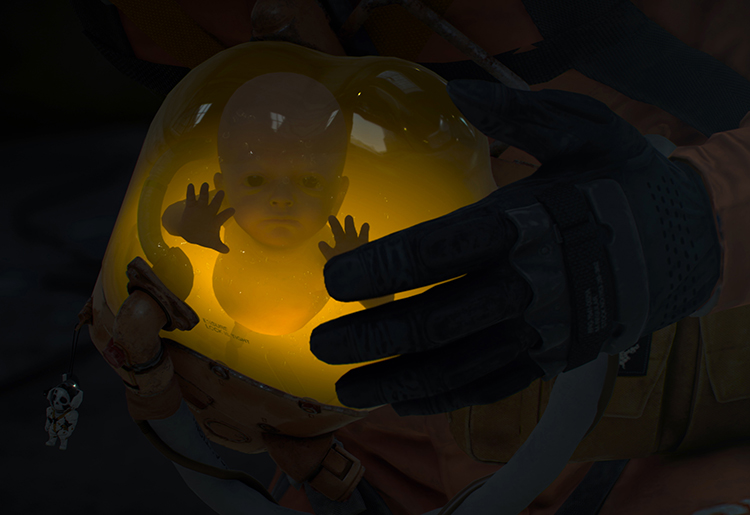
Characters exist along a spectrum of relation to the United Cities of America and Bridges, from Die-Hardman’s deep commitment to the UCA project to Deadman’s paranoid rule-following (These atrocities are terrible, Deadman tells you just after revealing some dirty secrets and just before explaining he can’t possibly disobey the President). There are preppers who tell you they’ll never join the UCA but who will sign up on the chiral network, and others that jump right into the union citing a need for connection and belonging. The villains in the story are nihilists, bent on extinction, which puts your goal in a strong inverted light—you’re meant to connect and revive the world, bring it back from the brink.
And at times, your character, Sam Bridges, seems to be on board with this project—in one of the game’s final moments, he delivers one of the least enjoyable pre-war speeches I’ve ever heard, but it’s one that is deliberately committed to connection, America, and the dream of democratic individualism. And then, very shortly afterwards with no clear reason why—based on acting performances and dialogue, it could be due to a profound loss in his life, or it could just be a whim—he rejects all of those ideas and insists on going his own way. When Sam, during a routine-at-first-but-ultimately-very-bad corpse disposal delivery, first meets the “Bridge Baby” BB-28, who helps him see BTs, he says the babies are creepy to him and seems honestly repulsed by it. And then, without any real character changes other than a connection that is portrayed more as shocking physically than emotionally, Sam is so attached to BB that he refuses to “decommission” it and gives it the name of his stillborn child, Lou. And don’t get me wrong, I like Lou a lot. The emotional resonance of Sam’s commitment is clear to any parent, and probably any non-parent too; but it feels motiveless, like a choice that needed to happen because of a script’s top-down emotional direction as opposed to a reflection of the characters who occupy that script.
(Incidentally, Kojima’s reliance on babies to produce emotional resonance in the game feels, often, pretty cheap—though Hayao Miyazaki’s critique of Osamu Tezuka’s reliance on material that “would be more moving” expresses this concern better than I ever could.)
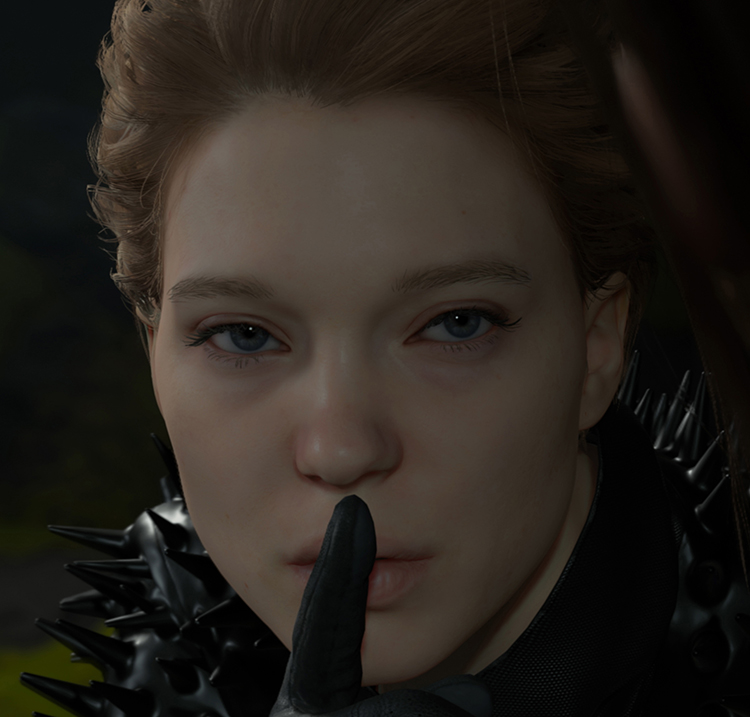
Once this tendency towards script progression begins to steer the central theme of the game, as opposed to some of the motivations and decisions on its periphery, then the argument the game tries to make becomes not only blurred but totally indistinct. Death Stranding sets out, seemingly, as a pro-American piece from the vantage point of an idealist: This country is worth rebuilding, and so we will do that. But midway through—without giving any specific spoilers—this vision is inverted, giving us the image of a rebuilt country that is bound to repeat the mistakes of America as opposed to overcoming them. The conclusion of the game, one might hope, would either tie these concepts together or destroy one in favor of the other. It would come to a conclusion. One would expect—I expected—to be able to say, “Here is the way Death Stranding thinks about America and about the national project in general.” And the fact of the matter is, I simply can’t—the game does not have a cogent conclusion to its central question.
Of course, I have a way I’d like to see this argument resolved: I’m sympathetic to the latter, cynical vision of America, that it is a flawed project and we deserve connection without the evils of the nation-state dragging us down. And I’d be willing to bet others who played the game came away hoping to see an ending that expressed a totally opposite position. But the game itself—what we should be premising our agreement or disagreement off of—is totally silent on the issue. Or, rather, it says a lot but without any content. Some characters seem to argue against the nation-state to the bitter end. Some argue for it. All seem to value connection, but in the sort of nebulous way one sees at the end of an early-2000s Final Fantasy game, not a politically cogent way. And Sam, our north star and player avatar? Depending on the situation, he changes his position dramatically and without warning. And without a cogent through-line, the game itself seems to shrug all of the issues it’s gathered into one big box marked “America is a complex thing” before concluding that each individual is right in their own individual way, and that the collective can be mean and venal and cruel, but should probably still exist.
This non-argument—everyone wins and no one loses—is disappointing in large part because Death Stranding is such a fun game to play with mechanically, and is so rich in potential as a result. A game premised on boredom and repetition, on the unglamorous work of delivery, on the literal weight of packages—that could have been a powerful vehicle for any number of claims. But instead, the game falls back on what have been fascinating themes for Kojima in the past, but now feel like somewhat obvious lodestars: fathers and sons; countries and hells for soldiers alone; and the extinction of the human race. And as these get filtered in, the game becomes more traditional and more cluttered, losing sight of the more staid but more important themes that flatten out as it concludes.
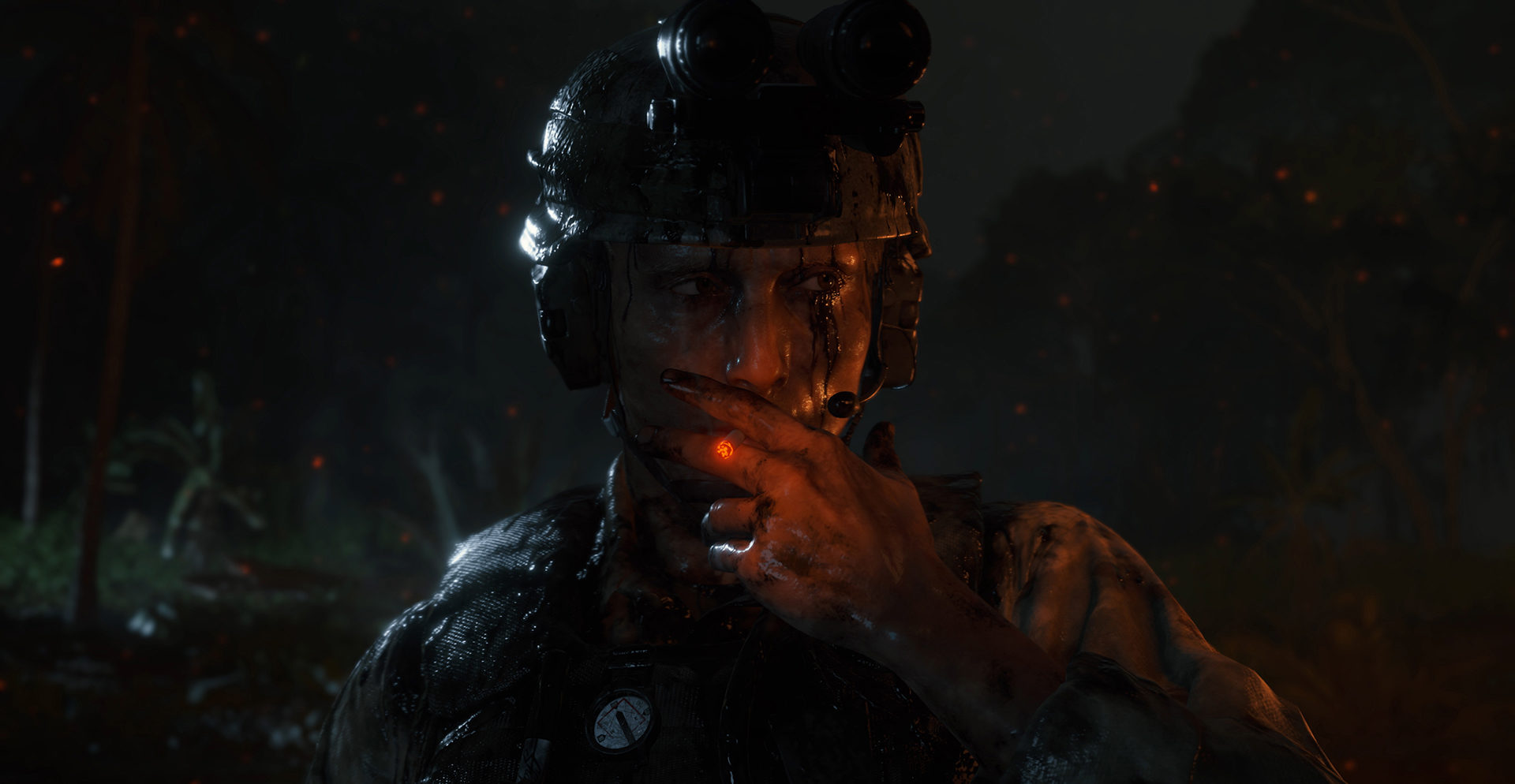
Credit: Sony, Kojima Productions
So, did I have fun playing Death Stranding? I absolutely did—I can’t lie, the delivery model just worked for me and the endorphins in my brain. And as I said above, I enjoyed following the storyline. But as much as I know I had fun with it, I can only really state that on the level of taste. The game itself relies on player opinion because it can’t (or won’t) actually make a claim itself.
In the end, Death Stranding juggles too many things at once, casting about to touch on every issue in such a way that it touches none of them sufficiently. Perhaps this is the fate of any triple-A game or any triple-A open-world game, but even if that’s the case, it is frustrating to see a game with so much good in it totally undercut and, yes, spoiled by an inability or an unwillingness to argue bravely for a particular and difficult claim.
Header image: Sony, Kojima Productions

Trevor Strunk is a recovering English PhD, teacher, podcaster, and dad who lives somewhere around Philadelphia. He talks about videogames with various guests on No Cartridge, a podcast that can be found where all good podcasts are provided, and occasionally writes at no-cartridge.net. You can follow his more transient thoughts @hegelbon on twitter. Oh and go play Outer Wilds, his 2019 game of the year!